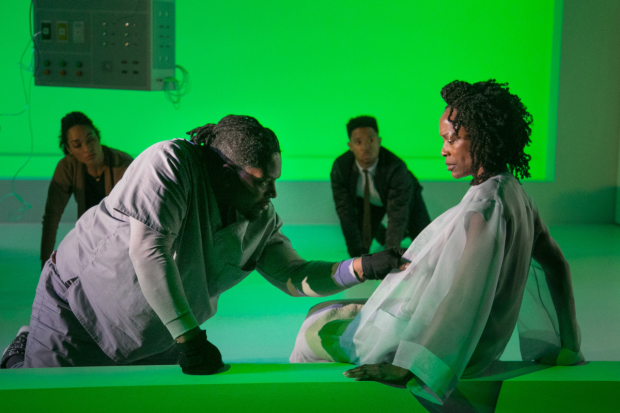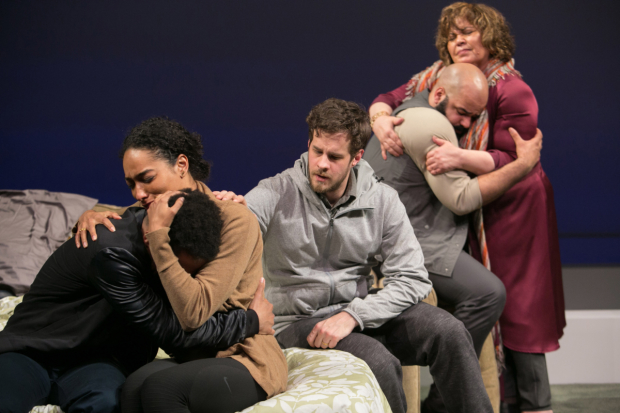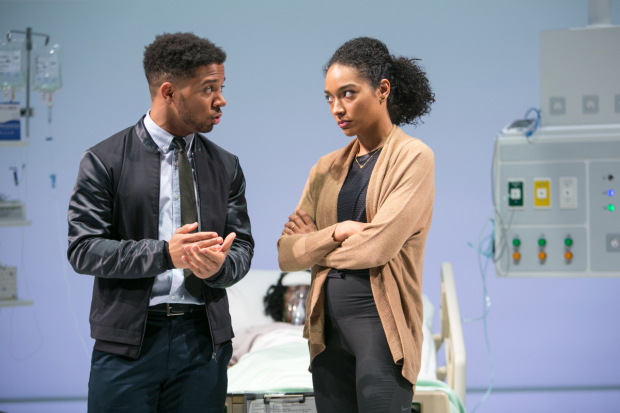
(© Erin Baiano)
A mostly African-American cast crawls around the stage on all fours, hooting and grunting like apes in Branden Jacobs-Jenkins' War, now playing LCT3's Claire Tow Theater. It's the kind of racially charged trollery that one could label over the top were it not arriving simultaneously with an avalanche of similarly crude Internet memes concerning the death of a silverback gorilla at the Cincinnati Zoo. As always, Jacobs-Jenkins' provocation (he is the author of An Octoroon and Neighbors, both of which employ blackface) feels acutely (and distressingly) on point.
War is not primarily about race (although it is a subject that seems to pervade every aspect of the story). Rather, this whip-smart play uncannily captures the family politics that rupture around the mortality of a parent, offering an uncomfortable reckoning for every mother, father, and child in the audience.
Washington, D.C. doyenne Roberta (Charlayne Woodard) has just suffered a stroke while visiting the zoo with Elfriede (an adorable Michele Shay), her alleged long-lost half-sister from Germany. Roberta's daughter, children's-author Joanne (Rachel Nicks), and her son, political consultant Tate (Chris Myers), have never heard of Elfriede, meeting her for the first time at the hospital. Obviously, they are hesitant to accede when Elfriede's short-tempered son, Tobias (Austin Durant), demands money — specifically his mother's share of their grandfather's sizable trust. For all they know, these two could be con artists. Tobias panics since he and his mother are abroad without enough money to return to Germany. Complicating matters, the only person who could validate their story is in the ICU.

(© Erin Baiano)
These tense waking moments are interspersed with scenes in which Roberta, in some sort of limbo, reconstructs her life with Alpha (Lance Coadie Williams), the leader of a band of gorillas (that was the exhibit she and Elfriede were viewing when she collapsed). She also speaks about her father, an army truck driver who served in occupied Bavaria, where the locals would make monkey noises as he drove by. All of this offers context for the present drama, even if it leaves us with doubts about the motives of the involved parties.
Director Lileana Blain-Cruz negotiates between these two distinct planes of existence with showmanship and efficiency. Laughter transitions into animalistic screaming as the family devolves into simian form. Bray Poor's disorienting 360-degree sound design helps create this gorilla purgatory. Matt Frey's sneaky lighting shifts from hospital florescent to a hazy blue as Woodard rolls in on a conveyor belt (Mimi Lien crafts an antiseptic hospital set that is also full of surprises) and directly addresses the audience. She comments on her family from off sides until we become so accustomed to this convention that she is able to fully join the stage picture while remaining in an alternate dimension.
Woodard is a delight as Roberta, easily chatting us up in her crisp mid-Atlantic (the dialect of the D.C. elite) as if we were guests at her luncheon. She oscillates between Clair Huxtable and Joan Crawford, the latter especially coming out when recounting her frosty relationship with the wayward Joanne, whom she accuses multiple times of being "embarrassing."
Clearly the favored child, her son has inherited her severity. With furrowed brow buried in his iPhone, Myers wholly embodies the overworked, prematurely jaded millennial. He's a 30-year-old gay man, conservative in his prejudices, if not yet his politics. "You’ve been better educated than ninety-nine percent of the country. You speak three languages, play two instruments…You could have had anyone," he venomously says to his sister, "But, for whatever reason, you landed here? With your unwritten children’s books. Not with a lawyer or a doctor or anyone with any ambition whatsoever but here, with a high school Spanish teacher." Her husband, Malcolm (Reggie Gowland, convincingly portraying a kind-hearted basic white guy), is there for the whole thing. Harvard-educated, Tate is a bully, employing his intelligence and rhetorical arsenal to cow his opponents into submission: "Why, Joanne? Because black plus every privilege under the sun equals mediocre and white?"

(© Erin Baiano)
Malcolm futilely attempts to respond by asking, "Aren’t we all descended from a bunch of monkeys in Africa!?" This causes his wife to hide behind a throw pillow in embarrassment. Nicks and Myers have an eerily believable sibling dynamic, with the former unafraid to use her sensitivity as a weapon. Despite his hardness and her outward softness, the two feel evenly matched, as if they have been fighting this war their entire lives.
One of the most exciting and prolific playwrights working in America today, Jacob-Jenkins exhilarates with Tate and Joanne's dramatically fraught and intellectually caffeinated exchanges. One feels like an Olympic runner trying in vain to keep pace with a faster opponent: We're never going to fully catch up, nor do we feel the urge to concede the race.
While Jacobs-Jenkins excels in delivering pointed barbs about auxiliary subjects (the construction of race in America, the limits of the welfare state in an increasingly heterogeneous Europe), he never allows us to lose sight of the universally recognizable story at the heart of the play: Everyone's parents will eventually die, so what is there to hold the family together after they are gone? With War, Jacob-Jenkins proves that family dramas can be intellectually stimulating, formally innovative, and emotionally engaging all at the same time.









